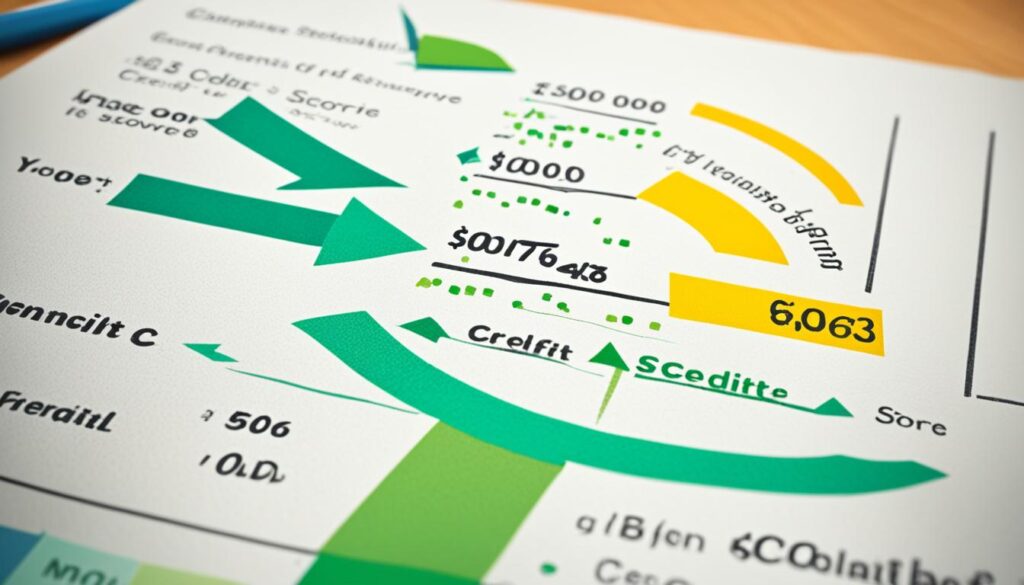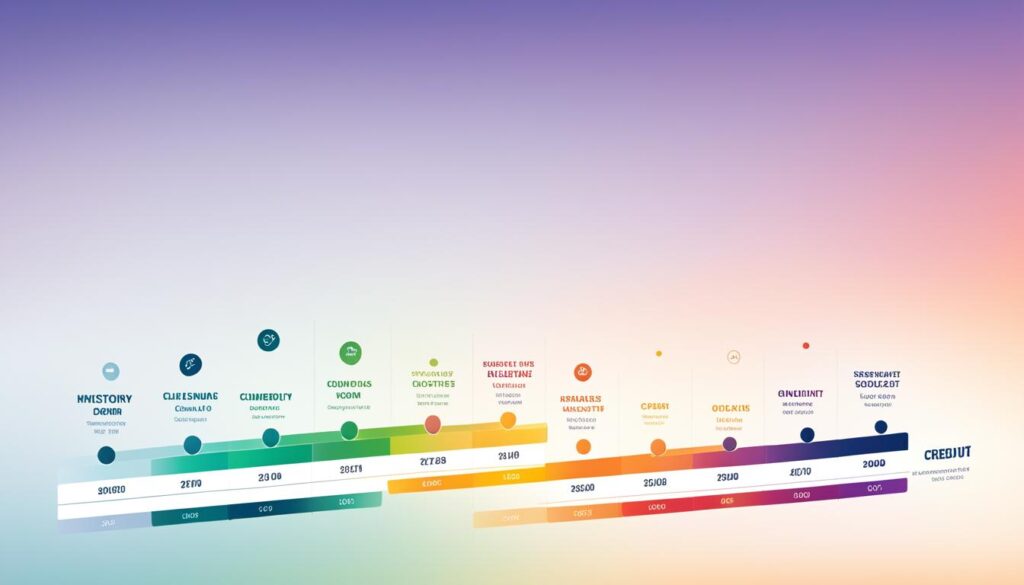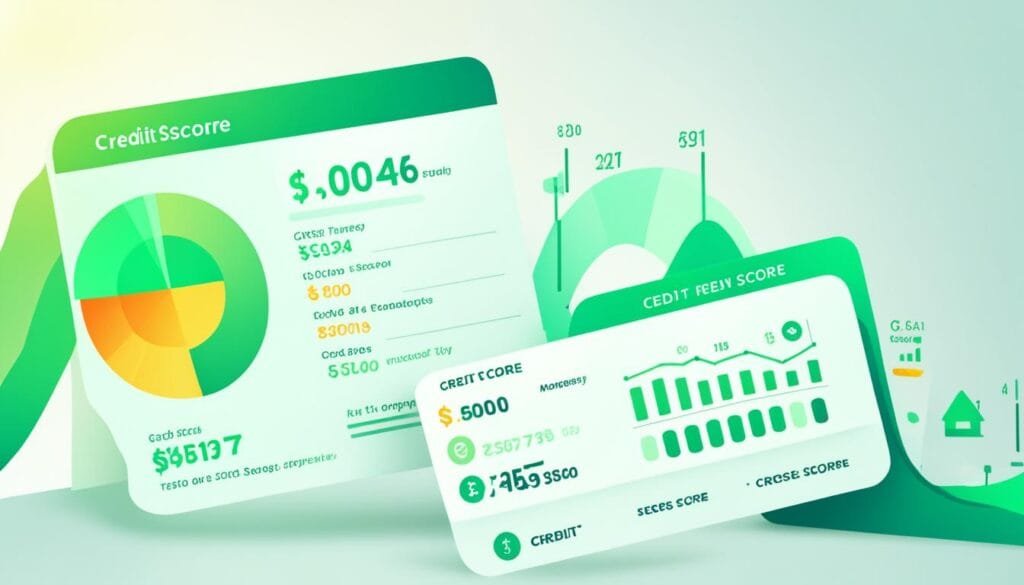Credit scores play a vital role in our financial lives, impacting our ability to secure loans, credit cards, and even rent an apartment. But have you ever wondered how credit scores are calculated and what factors influence them?
Credit scoring systems, such as the FICO® Score and VantageScore®, analyze credit report information to predict your creditworthiness. While the exact calculations for credit scores are closely guarded secrets, the factors that determine credit scores are publicly known.
The FICO® Score, used by 90% of top lenders, considers several factors and their respective weights:
- Payment history (35%)
- Amounts owed (30%)
- Length of credit history (15%)
- Credit mix (10%)
- New credit (10%)
VantageScore also considers similar factors in its scoring model. It’s crucial to understand these key credit score factors to improve your financial health and increase your creditworthiness.
Key Takeaways:
- Payment history, amounts owed, length of credit history, credit mix, and new credit all play a role in determining your credit scores.
- Making timely payments is crucial, as any late payments can have a significant negative impact on your credit scores.
- High credit utilization can harm your credit scores, while keeping your utilization below 10% is beneficial.
- Having a longer credit history tends to be positive for your credit scores.
- Diversifying your credit mix and avoiding opening too many new credit accounts within a short period can help maintain or improve your credit scores.
Payment History
Payment history is the most important factor in determining your credit score, accounting for about 35% of your FICO® Score. Making debt payments on time is crucial, as even a single payment made 30 days late can significantly harm your credit scores. Accounts sent to collections, foreclosures, and bankruptcies can have even more severe consequences. It’s essential to prioritize making timely payments to maintain and improve your credit scores.
When it comes to your payment history, consistency is key. Late payments can stay on your credit report for up to seven years and have a lasting negative impact. On the other hand, a history of on-time payments can demonstrate your reliability and boost your creditworthiness.
Missing a payment by just a few days may not seem significant, but it can still be reported to the credit bureaus and lower your credit scores. It’s important to stay organized and ensure that your bills are paid on time, whether it’s through manual payments or automatic withdrawals.
Creating a budget and setting reminders for due dates can help you stay on top of your payment obligations. If you’re struggling to make your payments, consider reaching out to your creditors to discuss payment arrangements or explore debt management options.
Key Points:
- Payment history contributes approximately 35% to your credit score.
- A single payment made 30 days late can harm your credit scores.
- Accounts sent to collections, foreclosures, and bankruptcies have severe consequences.
- Consistency in making on-time payments is crucial for maintaining good credit.
“A history of on-time payments can demonstrate your reliability and boost your creditworthiness.”
Amounts Owed
The amount of money you owe can significantly impact your credit score. In fact, it contributes to approximately 30% of your FICO® Score, making it a key factor to consider when managing your finances.
One crucial aspect of amounts owed is your credit utilization ratio, which measures the percentage of your available credit that you’re currently using. Maintaining a low credit utilization ratio is considered beneficial for your credit scores, with a utilization below 10% being ideal.
High credit utilization can negatively affect your credit scores, as it suggests a higher risk of not being able to manage additional debt responsibly. Lenders view this as a potential red flag and may perceive you as a higher credit risk.
To improve your credit scores, it’s recommended to pay down high balances and keep your credit utilization as low as possible. Doing so can lead to a quick improvement in your credit scores and demonstrate responsible credit management to potential lenders.
Let’s take a look at an example that illustrates the impact of credit utilization on credit scores:
| Credit Utilization | Credit Score |
|---|---|
| 10% or lower | Excellent |
| 10-30% | Good |
| 30-50% | Fair |
| Above 50% | Poor |
This table showcases how different credit utilization ranges correspond to credit score ratings. Keeping your credit utilization low can help you achieve better credit scores, while high utilization may have a negative impact.
Remember, responsibly managing your debts and keeping your credit utilization low is crucial for maintaining a healthy credit profile.

Length of Credit History
The length of your credit history plays a significant role in determining your credit scores. It accounts for approximately 15% of your FICO® Score, making it a crucial credit score factor. Having a longer credit history tends to be positive for your creditworthiness.
When evaluating the length of your credit history, credit scoring models consider various factors, including the age of your oldest and newest credit accounts, as well as the average age of all your accounts. This information provides insights into your credit management and stability over time.
It’s important to note that closing accounts or paying off loans in full may not immediately impact the length of your credit history. Accounts in good standing can remain on your credit report for up to 10 years, contributing to the overall length of your credit history.
Building a long credit history demonstrates your ability to responsibly handle credit over an extended period. Lenders view this positively, as it allows them to assess your creditworthiness based on a substantial track record rather than making decisions solely on limited information.
However, if you are new to credit or have a relatively short credit history, there are still ways to establish a positive credit profile. By responsibly managing your credit accounts and making timely payments, you can start building a strong credit history, which will contribute to improving your credit scores over time.
Why Is Length of Credit History Important?
Your credit history provides lenders with insights into your credit management habits, including your ability to repay debts on time and use credit responsibly. The length of your credit history demonstrates your experience and consistency in handling credit accounts and financial obligations.
A longer credit history allows lenders to assess your creditworthiness more accurately. It provides a clearer picture of your financial habits and patterns, enabling lenders to make informed decisions regarding your creditworthiness and the level of risk associated with lending to you.
When evaluating applicants with limited or no credit history, lenders may find it challenging to assess their creditworthiness. Limited credit history can make it difficult for lenders to predict an individual’s likelihood of repaying debts on time or managing credit responsibly. Consequently, those with shorter credit histories may face challenges in obtaining credit or may be subject to higher interest rates.
By maintaining a long credit history, you demonstrate to lenders that you have a proven track record of managing credit responsibly. This can increase your chances of being approved for loans, credit cards, and other forms of credit, often at more favorable interest rates and terms.
It is worth noting that the length of your credit history is just one of several factors that lenders consider when evaluating creditworthiness. Other factors, such as payment history, credit utilization, credit mix, and new credit, also play important roles in determining your credit scores.

| Credit Score Factors | Description | Weight |
|---|---|---|
| Payment History | Record of your past payment behavior and the timeliness of your payments. | 35% |
| Amounts Owed | The total amount of debt you owe and your credit utilization ratio. | 30% |
| Length of Credit History | The overall age of your credit accounts and the average age of all your accounts. | 15% |
| Credit Mix | The variety of credit accounts you have, such as credit cards, mortgages, and loans. | 10% |
| New Credit | Recent credit inquiries and the number of newly opened accounts. | 10% |
Credit Mix and New Credit
In addition to payment history, amounts owed, and length of credit history, credit mix and new credit are important factors that can impact your credit scores. Understanding how credit mix and new credit influence your creditworthiness is essential for maintaining a healthy credit profile.
Credit Mix
Credit mix refers to the different types of credit you have in your financial portfolio. Lenders like to see a diverse mix of credit, including both installment debt and revolving accounts. Installment debt includes loans with fixed monthly payments, such as mortgages, car loans, or student loans. Revolving accounts, on the other hand, refer to credit cards and lines of credit with varying balances and flexible repayment terms.
Having a balanced credit mix can demonstrate your ability to manage different types of credit responsibly. It shows lenders that you can handle long-term loans and short-term credit simultaneously, which can positively impact your credit scores.
New Credit
New credit refers to the recent credit inquiries and applications you’ve made, as well as the opening of new credit accounts. When you apply for new credit, such as a credit card or a loan, the lender will pull your credit report to assess your creditworthiness. This is known as a hard inquiry, and it can slightly impact your credit scores.
Opening several credit accounts within a short period of time can potentially raise red flags to lenders. It may indicate that you’re taking on excessive debt or experiencing financial instability. Therefore, it’s generally advisable to be cautious when applying for new credit.
How Credit Mix and New Credit Impact Your Credit Scores
Both credit mix and new credit make up about 10% of your FICO® Score. While this weighting is relatively smaller compared to other factors, it’s still crucial to pay attention to these elements. Maintaining a diverse credit mix and being judicious in your new credit applications can help improve your credit scores.
| Credit Mix | New Credit |
|---|---|
|
|
What Are the Key Factors That Affect Credit Scores?
When it comes to understanding credit score factors explained, it’s crucial to consider payment history, credit utilization, length of credit history, types of credit used, and new credit inquiries. Each of these factors can have a significant impact on an individual’s credit score, influencing their overall financial health.
Conclusion
Understanding the key credit score factors is of utmost importance when it comes to managing your financial health. Payment history, amounts owed, length of credit history, credit mix, and new credit all contribute to the calculation of your credit scores. By focusing on these factors and implementing responsible credit behavior, you can work towards improving your creditworthiness over time.
One of the most critical factors is your payment history. Making your debt payments on time is crucial to maintaining good credit scores. Even a single late payment can have a significant negative impact. Additionally, the amounts you owe, particularly in relation to your available credit, significantly influence your creditworthiness. It’s important to keep your credit utilization ratio low and pay down high balances to improve your scores.
The length of your credit history also plays a role in your credit scores. Having a longer credit history generally works in your favor, so it’s advisable to keep your older credit accounts open and active. Diversifying your credit mix by having a variety of credit types, such as installment debt and revolving accounts, can have a positive impact on your creditworthiness.
Lastly, be mindful of new credit. Opening multiple credit accounts within a short period or having numerous credit inquiries can raise concerns for lenders. It’s vital to review your credit reports regularly, correct any inaccuracies, and practice responsible credit habits to build a robust credit profile.
FAQ
What factors determine credit scores?
The factors that determine credit scores include payment history, amounts owed, length of credit history, credit mix, and new credit.
How does payment history affect credit scores?
Payment history is the most important factor in determining credit scores. Making debt payments on time is crucial to maintaining and improving your credit scores.
How does the amount owed impact credit scores?
The amount of money you owe, measured by your credit utilization ratio, has a significant impact on credit scores. High credit utilization can negatively impact your scores, while keeping it below 10% is considered beneficial.
What role does the length of credit history play in credit scores?
The length of your credit history accounts for approximately 15% of your credit score. Having a longer credit history tends to be positive for your scores.
How do credit mix and new credit affect credit scores?
Credit mix refers to the variety of credit types you have, while new credit considers recent credit inquiries and the number of new accounts opened. Both factors account for about 10% of your credit score.
Why are understanding credit score factors important?
Understanding credit score factors is essential for managing your financial health. By focusing on the key factors that influence credit scores, you can improve your scores over time and build a strong credit profile.

